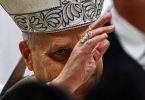by Brian Dryden
OTTAWA, Ontario (CNS) — Canada’s Catholic bishops have “unequivocally” apologized for the Catholic Church’s role in the residential school system and have raised the possibility of a visit by the pope to Canada as part of the “healing journey” between Canada’s Indigenous peoples and the church.
In a statement released by the Canadian Conference of Catholic Bishops at the end of the CCCB’s annual plenary assembly Sept. 24, the bishops said, “We acknowledge the suffering experienced in Canada’s Indian Residential Schools.”
“Many Catholic religious communities and dioceses participated in this system, which led to the suppression of Indigenous languages, culture and spirituality, failing to respect the rich history, traditions and wisdom of Indigenous peoples,” said the statement released by the bishops’ conference. “We acknowledge the grave abuses that were committed by some members of our Catholic community: physical, psychological, emotional, spiritual, cultural and sexual. We also sorrowfully acknowledge the historical and ongoing trauma and the legacy of suffering and challenges faced by Indigenous peoples that continue to this day.”
Since unmarked graves of children were discovered at a former residential school in Kamloops, British Columbia, in May, the Catholic Church has been criticized for not doing enough to make amends for its role in the residential school system. There also have been renewed calls for Pope Francis to visit Canada to issue a formal apology on behalf of the church on Canadian soil, which was one of the Calls to Action by the Truth and Reconciliation Commission.
The residential school system was established by the federal government, but most schools were run by religious organizations. Orders within the Catholic Church ran about half the schools identified in the 2006 Indian Residential School Settlement Agreement.
A delegation of Indigenous leaders is scheduled to meet with Pope Francis in the Vatican in December to address the church’s role in Canada’s residential schools.
“Having heard the requests to engage Pope Francis in this reconciliation process, a delegation of Indigenous survivors, elders/knowledge keepers, and youth will meet with the Holy Father in Rome in December,” the CCCB’s Sept. 24 statement said.
“Pope Francis will encounter and listen to the Indigenous participants, so as to discern how he can support our common desire to renew relationships and walk together along the path of hope in the coming years,” the CCCB said. “We pledge to work with the Holy See and our Indigenous partners on the possibility of a pastoral visit by the Pope to Canada as part of this healing journey.”
In a statement, Assembly of First Nations National Chief RoseAnne Archibald welcomed the apology but said it stopped short of inviting the pope to Canada to personally apologize.
“On one hand, their unequivocal apology is welcomed,” she said. “However, I am disappointed that the Canadian Conference of Catholic Bishops did not take the long overdue step of passing a motion/resolution to formally invite the pope to Canada to offer his apology to First Nations and Indigenous survivors and intergenerational trauma survivors here on Turtle Island.”
She added that the church was still well short of meeting the goal of $25 million in a “best efforts” campaign as part of the Indian Residential School Settlement Agreement. That campaign of 2008-2013 for healing and reconciliation projects raised only $3.7 million. Further fundraising campaigns have been initiated by some dioceses in the past few months.
“The words of the apology speak to a commitment by the Catholic Church to the healing path forward with First Nations and Indigenous peoples,” Archibald said. “Only time will tell if concrete actions will follow the words of contrition by the bishops.”
On Sept. 27, the Canadian Conference of Catholic Bishops announced plans to raise $30 million over five years to support healing and reconciliation initiatives for residential school survivors, their families, and their communities across the nation.
In a statement, the bishops said, “The commitment will be achieved at the local level, with parishes across Canada being encouraged to participate and amplify the effort.”
“Funding for projects will be determined locally, in consultation with First Nations, Métis and Inuit Peoples in each region,” the statement said. “The bishops of Canada have committed and tasked themselves to develop national principles and strategy, timelines, and the public communication of these collective initiatives this November.”






